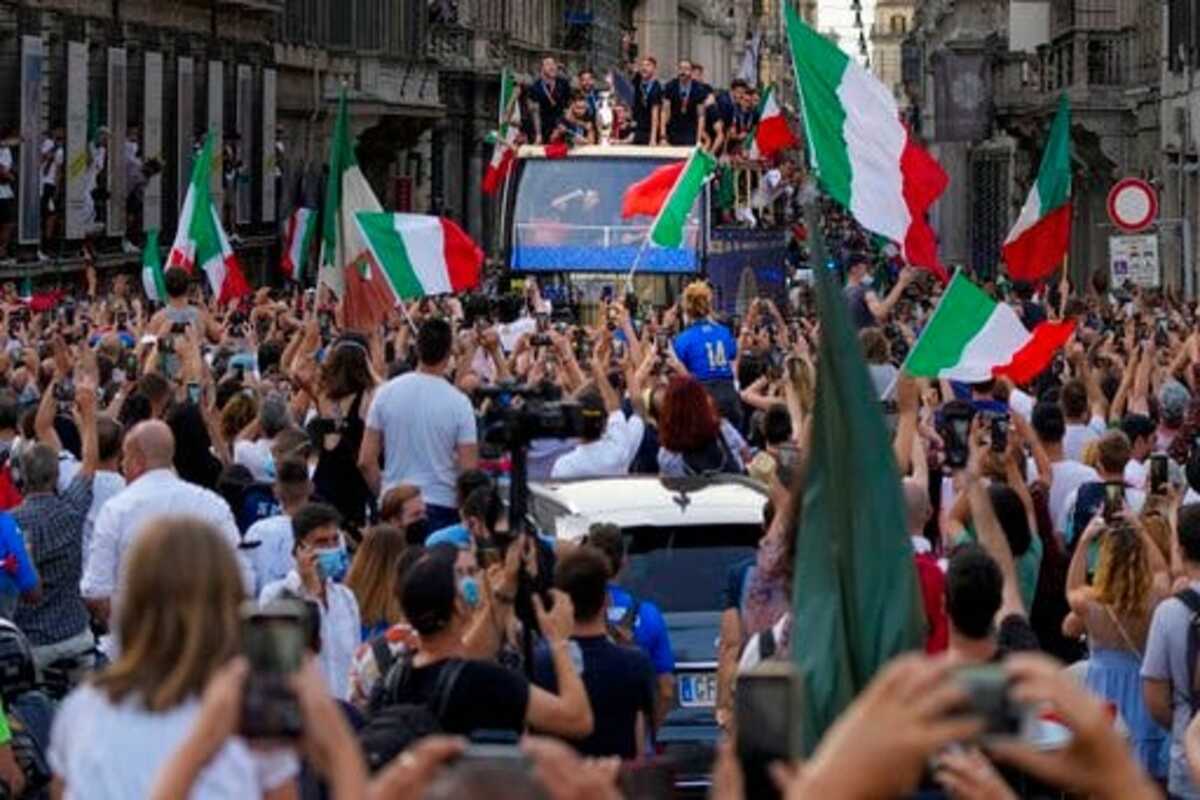One of my Italian friends, a professor in Milan, was in Napoli on the day of the Euro 2020 final between Italy and England. He wrote me an email explaining his interesting anthropological experience: “I watched the game here, in a pizzeria on the street. When the final kick declared victory for Italy people went (into) hysterics, everybody was in the street, by car and on foot, shouting and chanting with the national flag everywhere. It was a crazy event of total collective liberation.”
I can understand the craziness of the people in such football loving nations – there’s no surprise that people went hysterical in such a major victory. But where did the sense of “total collective liberation” come from? Is it from the prolonged misery and restrictions due to Covid-19? From the ashes of devastation? Did people take this excuse to revolt against Covid-related restrictions? Or, was it a ‘Covidiot’ moment that they were longing to stage?
Advertisement
During the same time, Copa America took place in Brazil after Argentina and Colombia were pulled as organizers. And no fans were allowed in stadia despite the insistence of President Jair Bolsonaro, who is known as a critic of lockdown measures. Rio de Janeiro officials, however, allowed limited spectators in the final at the Maracana Stadium, 10 per cent of capacity – only for the invitees of the South American soccer federation CONMEBOL.
And the Tokyo Olympics beginning 23 July will also be staged without spectators. It’s not that the policy-makers of the host countries of UEFA Euro Cup didn’t understand the underlying risk factors of football with thousands of domestic and international crowds. Still, all the eleven host cities allowed some spectators into their stadiums during the matches. The eastern venues allowed the most.
While Budapest’s Puskas Arena hosted a full capacity crowd of 61,000, Baku and St. Petersburg kept their stadiums half full, 35,000 in Azerbaijan and 30,000 in Russia. The other stadiums were filled with 10-45 per cent capacity. At the request of UEFA, Britain agreed to increase Wembley’s capacity during the semi-finals and the final, although experts warned that allowing more than 60,000 fans to crowd into Wembley is a “recipe for disaster” given the prevalence of the highly contagious delta variant in the UK.
The roots and support base of the ugly scenes of vandalism and racial abuse in London on the day of the final are now a subject of global discussion. However, these are certainly more destructive amid a world-ravaging pandemic. According to UK’s National Centre for Domestic Violence, instances of domestic violence in the UK go up by a huge 26 per cent when the England men’s national football team is in action, and cases rise by a whopping 38 per cent when England loses a football game.
This dark side of football fanaticism in the UK is not unknown though. Doesn’t the administration need to be extracautious during such a pandemic? Euro 2020 ought to fuel a rise in Covid cases in Europe. “It’s that demographic, those football-loving male, predominantly, individuals of a particular age group that we’re now seeing a surge in,” according to an immunologist, which was now widely quoted in media. The stadiums were “full to bursting” in cities during various games of Euro 2020, with beer-swilling fans packed into a rocking stadium, little signs of social distancing and few masks in sight.
Such recklessness amid a devastating pandemic left many people stunned. Infections among fans in Denmark, Finland, and Scotland after they attended Euro matches have already been reported. Even UEFA’s medical chief said it “cannot be excluded” that there will be Covid cases linked to matches at Euro 2020. Health experts, however, had expressed repeated concerns about Euro 2020 events becoming superspreaders throughout the tournament.
As an WHO emergency officer said, one needs to look much beyond just the stadiums themselves. “We need to look at how people get there, are they travelling in large crowded convoys of buses? And when they leave the stadiums, are they going into crowded bars and pubs to watch the matches?”
What about the concerned governments? The UK government, for example, certainly has the evidence of the potential negative impact of a European Champions League soccer match between Liverpool and Atletico Madrid back in 2020. In any case, all remaining lockdown restrictions in England will be lifted on July 19. Then, just before the final match, on July 8, renowned medical journal ‘The Lancet’ published a letter signed by over 100 scientists from across the world calling on the UK government to not go ahead with its plan to lift Covid-19 restrictions on July 19.
The scientists termed the decision “a dangerous and unethical experiment”. “Preliminary modelling data suggest the government’s strategy provides fertile ground for the emergence of vaccine-resistant variants. This would place all at risk, including those already vaccinated, within the UK and globally,” they wrote. There are critics of allowing spectators during Euro 2020 though.
“I think it is irresponsible for tens of thousands of people to congregate in a small area in countries that are considered to be virus variant areas of the highly contagious delta [variant],” German Minister of the Interior Horst Seehofer told the German newspaper Süddeutsche Zeitung, adding that Chancellor Angela Merkel shared the view. Seehofer thought that UEFA seemed to have been driven by commercial considerations, and commercialism should “not overshadow the protection of the population against infection.”
The interior minister believed that a capacity of 20 per cent, as in Munich, could be “a benchmark that could also apply to the other venues”. Karl Lauterbach, a health expert in the German parliament, even went on to say: “UEFA is responsible for the deaths of many people.” The Bavarian state premier Markus Söder said: “To be the starting point for a super-spreader event, football is not worth it in that proportion. Enjoy, yes, but enjoy with reason.” What is the actual ‘reason’ then? Is boosting the devastated economy the main reason for Europe to ‘enjoy’ football?
Well, pubs in England, for example, were expected to sell 13 million pints on the day of the final match with 7.1 million during the match itself, as estimated by the British Beer and Pub Association. It’s, however, far less than 17 million, the expected amount had there been no Covid restriction. But, in order to save the economy, did the authorities allow too much amid a worrisome situation?
“The images of the European Football Championship so far gave the impression that the pandemic was over,” Winfried Kretschmann, the premier of the German state Baden-Württemberg, told Redaktionsnetzwerk Deutschland. “That is an absolutely wrong signal.” And, did common people of Europe, after a difficult 18 months of severe restrictions and disastrous time period, apparently get a chance of “total collective liberation” through this football fiesta? But, in the process, they certainly misunderstood the meaning of “liberation”. Such a fiesta would further impede global efforts to contain the pandemic. No doubt about that.
(The writer is Professor of Statistics, Indian Statistical Institute, Kolkata)











